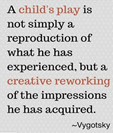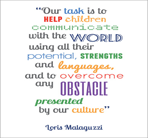The Grammar of Fantasy was written by Italian writer and educator from Reggio Emilia Gianni Rodari. In the foreword, Herbet Kohl asks:
What is the place of imagination in education? The word imagination does not appear in the government’s list of goals, nor does it turn up on lists of behavioural objectives or educational outcomes. There is no imagination curriculum or pedagogy of the imagination in our schools. Yet if, as the poet Wallace Stevens wrote, “the imagination is the power of the mind over the possibilities of things” then to neglect the imagination is also to impoverish children’s worlds and to narrow their hopes. The possibilities of things – the counterfactual world of supposing and imaginings make it possible for children to stretch themselves beyond their everyday realities and confront experience with the question, “What if…?”
Rodari asks:
- ‘How can we encourage children to dance with their imagination?
- What strategies can we as educators employ?
- How can we ‘play’ with words with children to make them laugh?
- How can we encourage them to experience joy in creating nonsensical stories, poems and scripts?’
He asked two children to give him a word. One child gave him the word dog and the other child gave him the word closet. When the second word was read out, it was greeted by a burst of laughter. The word closet coupled with a dog was like a discovery, an invention and an exciting stimulus for the children’s imaginations.
Taking the words dog and closet and coupling them with prepositions many possibilities arise:
- the dog with closet
- the closet of the dog
- the dog in the closet
- the dog on the closet
Each of these offers possibilities for the imagination and for the invention of stories.
We would love to hear any accounts if you try this! Or, even better, your own strategies / examples that encourage children to “dance with their imagination”.
Speaking of imagination, have you seen Caine’s Arcade? Amazing!
And this is the follow up video to Caine’s Arcade.
For reflection
The Grammar of Fantasy was written in 1906.
- Would you say that in 2015 Kohl’s questions about imagination are still relevant?
- Do you think imagination appears in our government’s current list of goals and outcomes?
- Is imagination in the curriculum or pedagogy in our schools?
Share your thoughts below.



